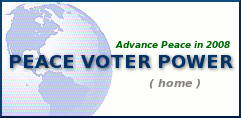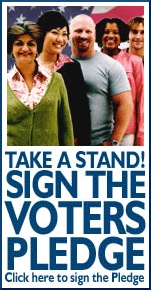
 |
||||||
| ||||||
|
Sign up for the VotersForPeace discussion list |
Send Survey to
the Candidates
A simple way to let the
candidates know you care about issues of war and peace is to send the
candidates a questionnaire. The Grassroots Netroots Alliance's first major project is a
comprehensive 2008 Candidate Survey (coming in March), which we are asking you to send
to all your elected representatives and candidates for office at the
local, county, state and federal levels. We want candidates to hear
from the grass roots � from the voters � rather than from
organizations.
The GNA survey has a
strong emphasis on war and peace, but then covers a range of issues.
Please click here to send the GNA Survey to candidates running to be
your elected representatives. The surveys received will be tallied
and reported on the GNA website. This will only take you a few
minutes, but could have a major impact by educating the
candidates about what voters care about and will allow voters to see
the candidates views on a range of issues.
Talk to Candidates while they Campaign
A tactic to let
candidates know what you think - to educate them and the public - is
bird dogging. But what is bird dogging?
bird-dog (b�rd'-d�g), v. Also birddog. To observe, follow, monitor and/or seek out with persistent attention.
When you ask a candidate a question in public there are several goals. First, you want the candidate to know voters care about the issue. The more candidates hear from voters the more they realize an issue is important. Second, you want to convince the audience that hears the question and the candidate�s response. Therefore your question has to be well thought out and present a brief argument that will stand on its own no matter what the candidate says. Third, educate voters about where a candidate stands. When you successfully ask the candidate a question, record the answer. This can include a written record or a video record. It is easy to film today, you can do so on your camera and upload it to YouTube or some other outlet.
The first challenge in bird dogging is to find our where the candidate is speaking. The more secure a candidate is, the less available they will be to the general public, as a result sometimes it is hard to find where a candidate will be. Here are some basic tips to address this problem:
1. Subscribe to a candidate's email list. Sometimes a politician will just announce where he/she is going to be.Once you find where the candidate will be the next challenge is getting to ask a question. Some tips:
2. Subscribe to state and party email lists. Both groups frequently promote their favorite candidates.
3. Get in with the local party -- get on their snail mail list and meet some of their leaders. You'll pick up a lot of info this way.
4. Find someone who's been active with the party for a long time who will be willing to pass on information to you. In some cases these individuals would love to bird-dog a candidate but can't because of appearances -- but they can pass info onto you so that you can do the "dirty work."
5. Find friendly members of the media to get info from. Some reporters really would like progressive issues to be part of the political debate.
6. Check other media sources such as newspapers and newspaper web sites. In some circumstances, the papers will have calendars announcing when political candidates will appear. This is far less likely in a non-election cycle year.
7. Make a small donation to the candidate and get put on their special friends list. Candidates fundraise by getting those who have donated in the past to give again. Therefore, they want donors to know where they are going to speak.
1. It's best to show up at an event early, particularly if the politician is popular, leading in the polls, or if it�s late in the primary season. You can't challenge them if you're not in their line of sight.
2. If there's a question and answer period your pre-planning will quickly become useful. A general rule is that most people don't raise their hands immediately. They need time to get their courage up or just become involved in the situation. Thus, as a bird-dogger, it's imperative that you express your interest in asking a question as quickly as you can. If you're not called on first you'll likely be called on second or third. If you wait ten minutes half the room will have their hands raised and you'll never get heard.
3. Take notes. Since bird-dogging can be a little nerve wracking it might be necessary to do these things in teams. One person challenges the politician, the other writes the response down. Remember, it's not only important that you get them on camera at that moment, it's also important that you be able to accurately quote them later on so that others can pick up where you ended. This is an integral part of effective bird-dogging politicians - make 'em responsible for their words and actions.
4. Work in teams of two or more people and disperse. Since bird-dogging can make many people nervous, it�s best to go in teams of two or more people. One person asks the question while another writes down the response. Dispersing at the event will possibly allow everyone in the group to ask a question. Be prepared with follow-up questions in case someone asks the question you intended to use.
Bird-dogging isn't just about asking questions. It can also take other forms such as street theater, pranks, or even a simple protest. The important aspect is: does it get a response from the politician or his/her staff? If it does, that's half the battle. The idea is to be creative. Maybe play good cop/bad cop, maybe agree with the candidate (rather, appear to agree) on a controversial issue in order to draw out a response that will be damming later on for the politician. Think creatively -- but do something that gets a response. Responses mean you can use the information later on and it means that the media will pay attention. It all results in helping create real change in our electoral politics, from the people running for office to the media reporting the stories to the cynical public which thinks none of it matters.
Bird-doggers also need to remember that anger does not pay. When you're going after a politician, especially one you don't like, you have to try to be at least cordial. It's part of the game. Butter 'em up a bit. Compliment them for something -- anything that you can think of that you might agree with them on. Hardly anyone is 100 percent opposite of where you stand politically. If it becomes necessary, step up the tone a bit, but only enough to become effective. Perhaps in some cases anger will get the response you want from a politcian or their staff. You should not do civil disobedience and outright loud protests unless you've reached a point of last resort with a particular politician. At that point the best you'll likely get is a media report on your actions, but real interactions with the candidate will be greatly reduced if not impossible.
Last but not least, pass your experiences on to others by submitting a report! Your work won't be lost, it will become part of a long term record that other activists will then be able to use to more effectively challenge a given politician.
Preparing questions for candidates is critical. Don't assume that you can nail a politician with something you think up at the last minute. Come up with your best questions/challenges and present them to at least one person who should play the devil's advocate. You'll quickly discover that many questions that you once thought were great can be quickly sidetracked or outright dismissed by a savvy politician.
VotersForPeace Project Board Member David Swanson has developed some questions to help spot a peace candidate. These questions (found at http://davidswanson.org/node/816) may be useful for you developing your own questions for candidates:
Do you oppose wars of aggression?
Do you oppose an aggressive US war on Iran?
Did you oppose the 2003 US war on Iraq?
Did you oppose the 2001 US war on Afghanistan?
Did you oppose the 1999 US war on Yugoslavia?
Did you oppose the 2006 Israeli war on Lebanon?
Have you ever spoken in support of, or voted to authorize, or voted to fund any portion of any of these wars? If so, please detail and please explain your motivations. Even if you voted to fund a portion of one of these wars but spoke against the war, please explain your vote.
Have you ever voted against authorization or funding of any portion of any of these wars? If so, please detail and please explain your motivations.
Do you support the power of Congress to declare wars?
Do you support the power of Congress to end wars?
Should a president ever attempt to launch a war without a Congressional declaration of war?
Should a president ever launch a war that is neither in strict self-defense nor authorized by the United Nations Security Council?
If Congress chooses to end a war, is it appropriate for Congress to enforce such a decision by ceasing to fund a war?
Should a president ever intentionally mislead the Congress or the public about grounds for a war?
In what ways should a president who misleads Congress and the public about the grounds for war be held accountable?
Do you support the maintenance of U.S. military bases in Iraq?
How many U.S. military bases are currently maintained in foreign countries? How many should be?
Do you support a military draft?
Do you support the use of mercenaries?
Which of the following actions do you consider acceptable during a war?Making first use of nuclear weapons.
Using depleted uranium weapons.
Using white phosphorus as a weapon.
Using napalm weapons.
Using cluster bombs.
Targeting civilians.
Targeting journalists.
Targeting hospitals and ambulances.
Detaining prisoners with no legal process.
Torturing.
Spying in violation of the law and the Bill of Rights.
Claiming the right to violate laws.
Leaking classified information.
Punishing whistleblowers.
Which of the following treaties will you commit to fully upholding?The Kyoto Treaty on Global Climate Change
The Biodiversity Treaty
The Forest Protection Treaty
The Nuclear Non Proliferation Treaty
The Comprehensive Test Ban Treaty
The Anti-Ballistic Missile Treaty
The Landmine Ban Treaty
The Biological Weapons Convention
The Chemical Weapons Convention
The International Criminal Court
The United Nations Charter
Have you accepted any contributions from any companies that produce weapons or tools of war? Will you commit to not accepting any such contributions?
If a president commits war crimes, should he or she be held accountable in international court?
If a president commits high crimes and misdemeanors, should he or she be impeached and removed from office?
What percentage of federal discretionary spending should be directed to wars and the military?
What changes would you make in the budget of the Department of Defense?
What diplomatic efforts would you make to reduce the likelihood of wars?
What aid and development efforts would you make to reduce the likelihood of wars?
What climate and energy policies would you follow to reduce the likelihood of wars?
Do you support the creation of a Department of Peace?

